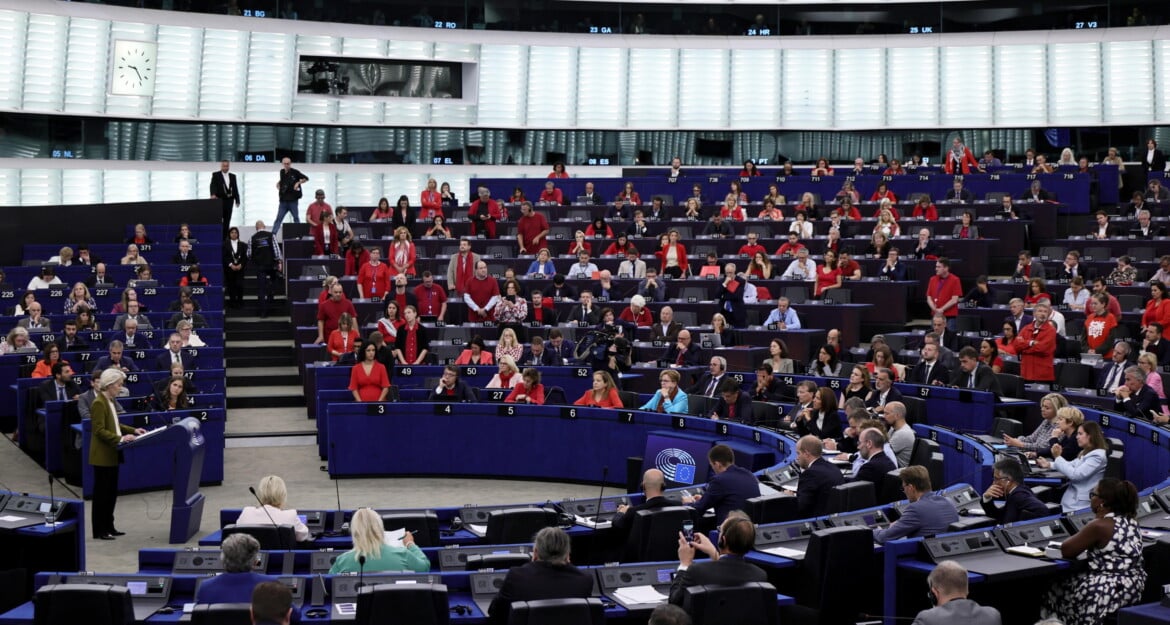Analysis
The ‘union’ is a figure of speech
Von der Leyen spoke as if she were the prime minister of a politically unified state. This is an illusion that undermines all her credibility. Throughout Europe, the center is being subjected to the blackmail or allure of the right.

Tasked with defending a position under attack on all fronts, EU Commission President Ursula von der Leyen resorted to vague promises in her State of the Union address, carefully avoiding any clear-cut stances. The circumstances of her re-election required her to dispel any lingering suspicion that she was seeking from the right what she could not obtain from the center-left.
Her appeal for unity among pro-European forces was meant to be reassuring only in this prosaic direction. And so, instead of an objective and necessarily critical analysis of the state of the Union, what she delivered was a cloying praise of its supposed virtues and potential.
Once again, the Commission president spoke as if she were the prime minister of a politically unified state seeking a parliamentary majority, behaving like a head of government intent on drumming up consensus for her platform. This is an illusion that undermines all her credibility, as it avoids grappling with the reality of Europe’s architecture and the fault lines running through it. It ends up being an attempt to compensate for the Union's lack of political agency through shortcuts, such as a push for rearmament or unified geopolitical stances.
Clear pushback came without delay from the German defense minister, who noted that military and foreign policy were not within the sphere of competence of the EU. This is demonstrated by the Commission’s extreme reticence on the issue of Gaza and regarding tools to pressure the Israeli government, where it is only now taking its first tentative steps with no guarantee of success.
As for the Green Deal, which has been pushed into the background amid complaints from the industrial and agricultural sectors, it is now re-emerging to offer some satisfaction to environmentalists, but only through boasts of a supposed European leadership in clean technology patents; to what extent they will be actually implemented remains to be seen.
To tell the truth that Ursula von der Leyen omitted, the state of the Union is dire. The tariff agreement with the United States, besides being completely inequitable, does nothing to stabilize transatlantic relations. And while the Commission president boasts of having averted a trade war for the moment, there is still room for guerrilla-style trade conflicts capable of inflicting deep wounds. Amid the painful crisis of the “Western camp,” the hour of European independence remains a mere proclamation, lacking a political foundation and the capacity for joint decisions. Even the almost unanimous pledge of support for the Ukrainian cause is riddled with numerous divisions, both spoken and unspoken.
But the main factor in the weakness of a political Europe is rooted in the balance of power that has taken hold in the Union’s most important countries – a balance that stems from the great advance of right-wing and far-right forces across the continent. This is true in France, Italy, and Germany, not to mention the countries of Eastern Europe that have long been captured by radical nationalist groups. In Germany, the far-right AfD has now earned its place as the largest party. France, with its left flank snubbed by Macron and mired in a deep political crisis with an uncertain outcome, must contend with the decisive weight of Marine Le Pen's party. In Italy, the right wingers, firmly in government, can even boast of their pro-European credentials whenever it suits them.
Throughout Europe, the center, starting with the German Christian Democrats, is being subjected to the blackmail – and sometimes the allure – of the right, on whose votes it has occasionally had to rely. And these centrist parties certainly have no intention of being tied down by the European Union in their national political contests.
It was Iratxe García Pérez, the leader of the center-left Socialists and Democrats (S&D) group, who warned Ursula that the one who will make any inclusive program like the one the Commission president tried to propose impossible is none other than Manfred Weber, the leader of the center-right European People's Party (EPP) to which von der Leyen herself belongs. As long as the right wing looms over the orientation of the center and the policies of the Union, a common European force capable of wielding influence on the global stage will remain nothing more than a figure of speech.
Originally published at https://ilmanifesto.it/lunione-e-una-figura-retorica on 2025-09-11
